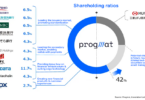On Wednesday, digital asset startup LevelField Financial said it was acquiring Chicago community bank Burling, whose deposits are FDIC insured and is Illinois state-chartered. LevelField wants to be a full service bank offering both traditional banking and compliant digital asset services.
The news comes just days after the Federal Reserve Board denied Custodia Bank’s application to become a member of the Federal Reserve System. The Fed also said it aimed to prevent uninsured state banks from holding most cryptocurrencies.
Regulators will have a say about whether the LevelField acquisition can proceed, hence the six to nine months completion period, which could be on the optimistic side.
“With this acquisition, LevelField will become a traditional bank, albeit one serving customers interested in the digital asset class,” said Gene A. Grant II, CEO of LevelField Financial. “We are thrilled to have the Burling executives join our leadership team, and together we intend to deliver fantastic customer service and well-designed products to customers who have an interest in accessing the digital asset class through a traditional bank.”
Talking to Coindesk, Grant said that the bank would not directly hold cryptocurrency. The terms and conditions on LevelField’s current website imply that the existing LevelField Financial entity acts as principal for certain crypto transactions and agent for others, and it offers crypto borrowing and lending services.
Burling Bank has $197 million in assets, and MarketWatch reported that LevelField is paying $50 million for the acquisition. Levelfield raised an $8m Series A funding round in 2021 and last year sought to raise $50 million, according to an SEC filing, although only $1 million of funding was confirmed at the time.
Before starting LevelField in late 2017, Grant worked for BBVA for eight years in Madrid and Houston, Texas where LevelField is based.
On the one hand, it may be an opportune time to create a crypto bank, given others are heading in the opposite direction. However, regulators will take some persuasion.
Signature Bank announced it is reducing its level of deposits from digital asset firms, although the bank has diversified activities and is reasonably conservative in its approach. Silvergate, which continues to be crypto-focused, suffered a $1 billion quarterly loss, mainly because it had to sell securities to repay depositors withdrawing funds following the FTX debacle. Bloomberg reported that U.S. Prosecutors are considering a fraud probe into Silvergate’s role in processing Alameda wire transfers for FTX customers.






